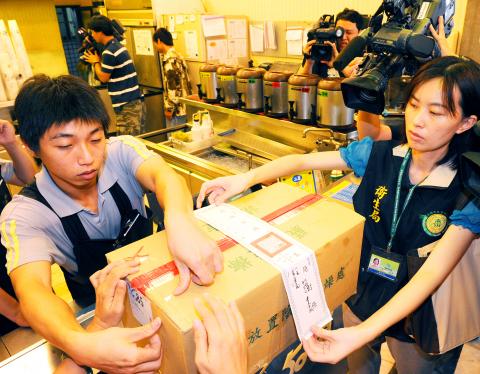The Department of Health (DOH) yesterday said it was in the process of proposing regulatory changes to require food and beverage manufacturers of a certain scale to hire technical experts to ensure that their food safety is up to par.
The latest food scare that began when authorities found contamination in ingredients sourced from Yu Shen Chemical Co (昱伸香料有限公司) and Pin Han Perfumery Co (賓漢香料公司) has prompted vows from lawmakers and government officials to stamp out illegally added harmful chemicals to foods, beverages, medicine and cosmetics.
The two firms have been found to use di(2-ethylhexyl) phthalate, or DEHP, and diisononyl phthalate, or DINP, respectively, in clouding agents they sold to food processors.

Photo: Huang Chi-yuan, Taipei Times
Health officials said proposed amendments to the Act Governing Food Sanitation (食品衛生管理法) would extend the Hazard Analysis Critical Control Point system to a more extensive list of food and beverage businesses, such as those who manufacture food additives and processed foods.
Businesses of a certain scale would be legally required to apply quality control management at every point in the manufacturing process and strengthen that process by having technical experts familiar with food sanitation codes on-site instead of the usual practice of hiring chemical engineers, said Tsai Shu-chen (蔡淑貞), chief of the Food and Drug Administration’s (FDA) food division.
“Chemical engineers may not be as familiar with food sanitation regulations as food scientists, who should be at manufacturing sites to ensure that the food products manufactured by a company adhere to the standards set forth by authorities,” Tsai said.
The government also wants to increase the maximum fines for food safety violations. Currently, violators who add illegal ingredients to food and beverages can be fined a maximum of NT$300,000 (US$10,500). Authorities want to boost the fines to between NT$1 million and NT$10 million, and increase the maximum prison term from three years to up to five years.
Meanwhile, Chen A-ho (陳阿和), the owner of Ging Kuo Wang (金果王), was detained by judges in Taipei yesterday for allegedly removing juice seized from his firm.
Chan and his son were called in for questioning yesterday. Shilin District (士林) prosecutors said Ging Kuo Wang bought questionable clouding agents from Yu Shen Chemical Co and added them to the juice it produces. The firm is the main provider to several vendors in the Shilin Night Market and other night markets, prosecutors said.
Prosecutors said they had seized two tonnes of questionable juice from the company and sealed it with official strips.
Chen’s son was released by prosecutors on bail of NT$150,000.
South Korea and China yesterday banned Taiwanese beverages, jams, syrups, jellies and other products suspected of DEHP contamination. Philippine authorities also ordered a massive recall of Taiwanese-made food and drink products.
Additional reporting by Rich Chang and AFP

US President Donald Trump yesterday announced sweeping "reciprocal tariffs" on US trading partners, including a 32 percent tax on goods from Taiwan that is set to take effect on Wednesday. At a Rose Garden event, Trump declared a 10 percent baseline tax on imports from all countries, with the White House saying it would take effect on Saturday. Countries with larger trade surpluses with the US would face higher duties beginning on Wednesday, including Taiwan (32 percent), China (34 percent), Japan (24 percent), South Korea (25 percent), Vietnam (46 percent) and Thailand (36 percent). Canada and Mexico, the two largest US trading

ACTION PLAN: Taiwan would expand procurement from the US and encourage more companies to invest in the US to deepen bilateral cooperation, Lai said The government would not impose reciprocal tariffs in retaliation against US levies, President William Lai (賴清德) said yesterday, as he announced five strategies to address the issue, including pledging to increase Taiwanese companies’ investments in the US. Lai has in the past few days met with administrative and national security officials, as well as representatives from various industries, to explore countermeasures after US President Donald Trump on Wednesday last week announced a 32 percent duty on Taiwanese imports. In a video released yesterday evening, Lai said that Taiwan would not retaliate against the US with higher tariffs and Taiwanese companies’ commitments to

‘SPECIAL CHANNEL’: Taipei’s most important tasks are to stabilize industries affected by Trump’s trade tariffs and keep negotiations with Washington open, a source said National Security Council Secretary-General Joseph Wu (吳釗燮) arrived in the US for talks with US President Donald Trump’s administration, a source familiar with the matter said on Friday. Wu was leading a delegation for a meeting known as the “special channel,” the Financial Times reported earlier. It marked Trump’s first use of the channel since returning to the White House on Jan. 20. Citing a source familiar with the matter, the Financial Times reported that Minister of Foreign Affairs Lin Chia-lung (林佳龍) was also a part of the delegation. The visit came days after China concluded war games around Taiwan and amid Trump’s

CHIP EXCEPTION: An official said that an exception for Taiwanese semiconductors would have a limited effect, as most are packaged in third nations before being sold The Executive Yuan yesterday decried US President Donald Trump’s 32 percent tariff on Taiwanese goods announced hours earlier as “unfair,” saying it would lodge a representation with Washington. The Cabinet in a statement described the pledged US tariffs, expected to take effect on Wednesday next week, as “deeply unreasonable” and “highly regrettable.” Cabinet spokeswoman Michelle Lee (李慧芝) said that the government would “lodge a solemn representation” with the US Trade Representative and continue negotiating with Washington to “ensure the interests of our nation and industries.” Trump at a news conference in Washington on Wednesday announced a 10 percent baseline tariff on most goods